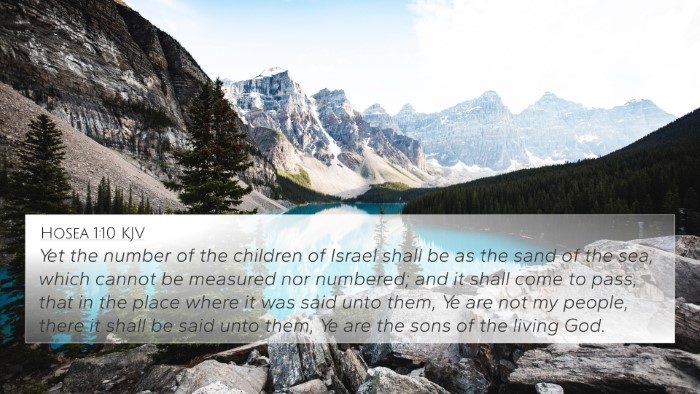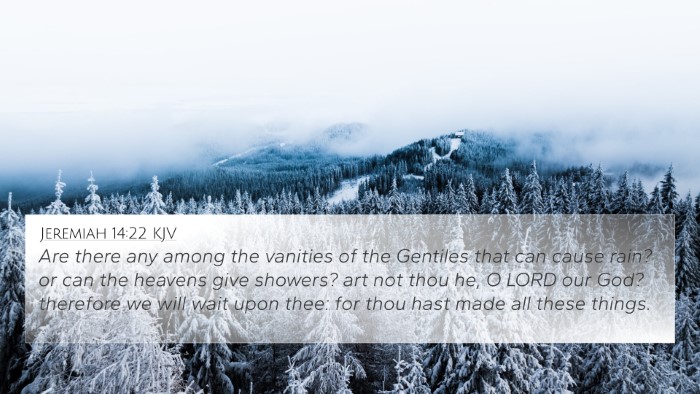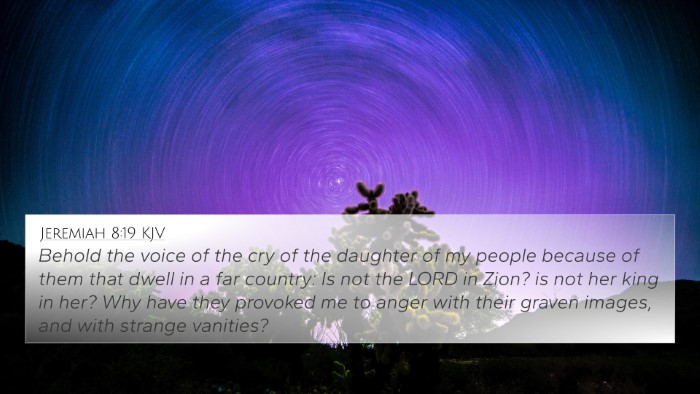Understanding Deuteronomy 32:21
Deuteronomy 32:21 states: "They have moved me to jealousy with that which is not God; they have provoked me to anger with their vanities: and I will move them to jealousy with those which are not a people; I will provoke them to anger with a foolish nation."
Summary of Meaning
This verse is part of a song that Moses recites to the Israelites, highlighting God's displeasure with their unfaithfulness. God expresses His anger at how the Israelites have abandoned true worship to engage in idolatry and foolishness. In response, God indicates that He will turn to a different people, thereby provoking Israel to jealousy. This serves as both a warning and an admonition about the consequences of infidelity to God.
Commentary Insights
Matthew Henry's Commentary
Matthew Henry emphasizes that the Israelites' actions have stirred God's jealousy. He notes that the phrase "not God" refers to idols and the false deities that take the place of the true God. This infidelity leads to a reciprocal response from God, where He will evoke jealousy in Israel by showing favor to those deemed 'not a people,' alluding to the gentiles. The warning is clear: turning away from God leads to dire consequences.
Albert Barnes' Notes
Albert Barnes highlights the concept of divine jealousy with respect to the attachment of the Israelites to worthless idols. He interprets God's response as a divine strategy to provoke the Israelites by extending grace and favor to another people, encouraging reflection on their choice to forsake God. Barnes points out the depth of Israel's spiritual blindness, paralleling this with New Testament themes where similar themes of salvation for the Gentiles serve as a model for jealousy and repentance.
Adam Clarke's Commentary
Adam Clarke elaborates on the idea of God provoking jealousy among the Israelite people by highlighting that God will turn His favor to a foolish nation, identifying their foolishness caused by abandoning the truth. Clarke brings attention to God's pattern of utilizing nations previously deemed insignificant to achieve His purpose, effectively reminding Israel of the importance of fidelity to their covenant with God.
Cross-References and Thematic Connections
This verse can be cross-referenced with the following Biblical passages:
- Romans 10:19 - Reflects the theme of provoking Israel to jealousy by the inclusion of the Gentiles.
- Exodus 20:5 - Discusses God's jealousy regarding idolatry.
- James 4:5 - Addresses the concept of divine jealousy in the context of friendship with the world.
- 1 Peter 2:9 - Speaks of a chosen people, emphasizing God's intention in selecting a people for Himself.
- Matthew 21:43 - Indicates the kingdom being taken away from Israel and given to a nation producing its fruits.
- Isaiah 65:1-2 - Illustrates how God reveals Himself to a people who were not seeking Him.
- Hosea 1:10 - Portrays the transformation of 'not my people' into 'my people,' signifying God's mercy towards the Gentiles.
Tools for Bible Cross-Referencing
To further explore the connections between Bible verses, consider utilizing the following tools:
- Bible Concordance - A useful tool for locating themes and keywords across the scriptures.
- Bible Cross-Reference Guide - A guide that helps in identifying related verses and thematic connections.
- Cross-Reference Bible Study Resources - Various materials that provide insights on inter-Biblical dialogues.
- Bible Chain References - Techniques for linking verses thematically or contextually.
Conclusion
Deuteronomy 32:21 serves as a vital reminder of the consequences of idolatry and the faithfulness of God to His people despite their unfaithfulness. This verse intricately ties into broader scriptural themes of jealousy, divine retribution, and the unfolding plan of salvation that extends beyond Israel to include all humanity. Through careful study and cross-referencing, believers can gain deeper insights into the richness of God's Word and how interconnected the Scriptures truly are.



















